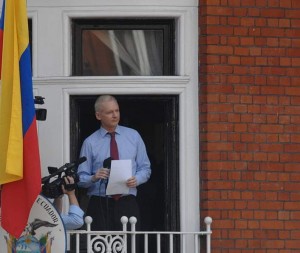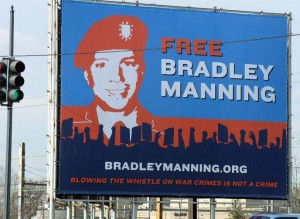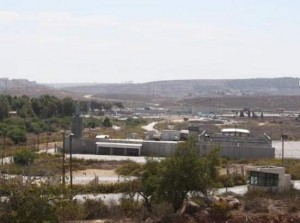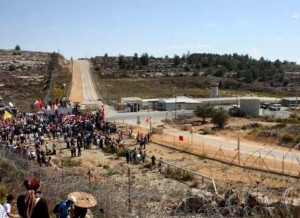Podcast: Play in new window | Download
Updates:
- FDNY Lawsuit Update
- Guatemalan Genocide Verdict Overturned
——


We Steal Secrets: The Story of Wikileaks – Michael Ratner
Our own Michael Ratner delivers a critical review of the film documentary “We Steal Secrets: The Story of Wikileaks” by director Alex Gibney. The annotated transcript, reveals errors, rank speculation and a focus on personality that detracts from the important revelations by Manning and published by WikiLeaks. Bradley Manning’s 12-week trial commences on Monday (3 June) and the film may have been released to take advantage of that date. Manning may face life in prison and could potentially face the death penalty. Julian Assange remains in the Ecuadorian embassy legitimately fearful that extradition to Sweden is a one way ticket to the US and potential for life in prison.
Attorney Michael Ratner, attorney in the US for Julian Assange and Wikileaks:
- (The film) does a great disservice to Bradley Manning and Julian Assange.
- I think it trivializes the incredible courage that both of them had as well as what was revealed by the documents.
- Julian Assange declined an interview by Alex Gibney and no one currently associated with Wikileaks participated in the film. This may explain in part Gibney’s poor treatment of Julian Assange.
- What grabs you immediately is the title, “We Steal Secrets: The Story of Wikileaks.” Wikileaks is a publisher. Yet the title implies that the story of Wikileaks is the story of it stealing secrets.
- That implication plays into the government’s theory that somehow Wikileaks and Julian Assange are co-conspirators with Bradley Manning in taking secrets. The film does so in other places as well.
- A second criticism is that part of the film focuses on Bradley Manning’s psychological problems and implies that those are the basis for Manning’s revelation of documents.
- Gibney has said as much in interviews given after the film: “I think it raises big issues about who whistleblowers are, because they are alienated people who don’t get along with people around them, which motivates them to do what they do.”
- In fact, Manning gave an incredibly moving political explanation for each leak of documents; an explanation not covered in any detail in the film.
- Third, Gibney claims Wikileaks is dead. Nothing could be more of fable.
- Since December 2011 Wikileaks has released the SpyFiles, the Stratfor emails dubbed the GIFiles, the Syria Files and in April 2013 both Cablegate and 1.7 million Kissinger Cables in an easily searchable Plus Public Library of US Diplomacy.
- Fourth, somehow, Gibney claims there are no charges filed against Julian Assange. How does he know that? It’s a secret Grand Jury, and if there’s an indictment, it’s going to be a sealed indictment because an indictment is not made public when a person is not in custody. In fact, there is significant, irrefutable evidence of an on going investigation and its likely there is a sealed indictment.
- Gibney diminishes the risk to Julian Assange if he were sent to the United States because he wants to claim that Assange is in the embassy to avoid going to Sweden to answer questions about sexual misconduct allegations. But it does not work. Were Sweden to guarantee Assange would not be sent to US he would go there to answer questions.
- Assange has also offered to answer those questions in the embassy–Sweden has refused. In the end, the problem is the United States–Gibney, in his effort to demean Assange, needs to play down the huge risk he faces in the US.
Law and Disorder Co-host Attorney Michael Ratner, President Emeritus of the Center for Constitutional Rights (CCR), a non-profit human rights litigation organization based in New York City and president of the European Center for Constitutional and Human Rights (ECCHR) based in Berlin. Ratner and CCR are currently the attorneys in the United States for publishers Julian Assange and Wikileaks. He was co-counsel in representing the Guantanamo Bay detainees in the United States Supreme Court, where, in June 2004, the court decided his clients have the right to test the legality of their detentions in court. Ratner is also a past president of the National Lawyers Guild and the author of numerous books and articles, including the books The Trial of Donald Rumsfeld: A Prosecution by Book, Against War with Iraq and Guantanamo: What the World Should Know, as well as a textbook on international human rights.
——-


Palestinian Prisoners Legal Support: Addameer
On the 17th of April, hundreds of Palestinians filled the streets in the West Bank in protest to mark Palestinian Prisoners Day. Right now there nearly 5000 Palestinian security prisoners in Israeli jails, 14 of them are women. More than half have been convicted, 33 percent have not been sentenced and 3 percent are being held in administrative detention. 235 of Palestinian prisoners are minors ranging in age from 14 to 18. As many listeners may know, Palestinian activists are often targeted and detained. In prison, tactics are used such as solitary confinement and forbidding family contact.
- Currently there are still 4900 Palestinians inside Israeli prisons. Most of them are adults. There are 236 minors under age 18. 14 women and 14 Parliamentarians.
- The majority of them I would say were arrested because of political activism and being involved in the peaceful struggle, and resistance especially in the last couple of years against the wall, the checkpoints, the settlements, land confiscation, house demolition all these practices of the occupation.
- Including Jerusalem residents, they would be arrested inside Israel but they could be subjected to 2 different legal systems. The Israeli legal system or the military system that applies just to the Occupied Territories.
- Settlers are not subjected to the military court system that is imposed on the Palestinians in the Occupied Territories.
- It’s violation of International Law to move them to prisons inside Israel. This is what Israel was doing since 1995.
- They moved the prisoners from prisons inside the Occupied Territories to prisons inside Israel and this is a violation for the 4th Geneva Convention Act actually.
- The number of Palestinian prisoners decreased compared to previous years, 2005, 2006.
- Since 1967 til today more than 750 thousand Palestinians were arrested. It’s almost hitting every Palestinian house. It’s estimated to be about 40 percent of the Palestinian men population that were at least once incarcerated in their life.
- In the 7 years of Oslo, Israel kept 1500 political prisoners.
- Now I can say that the majority of the prisoners would be sentenced for periods less than 10 years.
- There’s around 430 of them sentenced for life.
- We still have cases of families where they have 4 sons or 5 sons in the same time in prison.
- In some cases they (the sons) would be distributed in all prisons, in north, south of Israel and the mother would be traveling all the way trying to visit them.
- The women prisoners number was much higher we used to have 120 female prisoners.
- Most of them involved in political activism, mainly supporting their brothers or husbands in their political activism or in stop cases involved in trying to stop soldiers.
- Addamer was established in 1991 by ex Palestinian political prisoners and lawyers who were aiming to give legal support for free to Palestinian prisoners in military court system.
- Our focus is on political arrests. We have 8 members in Addamer. We are members of the Israeli Bar Association and members of the Palestinian Bar Association.
- Most of the cases in military court would end in plea bargain without exhausting the system because neither the system or the lawyers don’t have much trust in the system.
- You could end up being interrogated in the detention centers inside Israel and they will decide whether to transfer the case for the civil prosecution or the military prosecution.
- You can have a person 90 days before charging them (military system) Civil system it’s 35 days.
- Law In These Parts – Film Documentary.
- Regarding torture and terms such as enhanced interrogation techniques : In our place its called moderate physical pressure.
- We can’t sue them because the prosecutors claim out of necessity we used the torture.
- Seeing the photos of Abu-Ghraib with this sack on the detainee’s heads, this was used in the Palestinians case since the early years of the occupation.
- This is the method that was used to prevent them from breathing, from sleeping, and they were tied to these kindergarten small chairs with the sack on their head, with playing music 24 hours a day. Then after in this position for 2 weeks, the interrogator shake you.
- We’re promoting Boycott Divest and Sanction.
Guest – Sahar Francis, human rights lawyer and director of the Palestinian NGO Addamer. (Arabic for conscience) Prisoners Support and Human Rights Association is a Palestinian non-governmental, civil institution which focuses on human rights issues. Established in 1992 by a group of activists interested in human rights, the center offers support to Palestinian prisoners, advocates the rights of political prisoners, and works to end torture through monitoring, legal procedures and solidarity campaigns.It’s an organization offering legal services to political prisoners under Israeli occupation and represents prisoners in Israeli military and civil courts.
————————————————————–